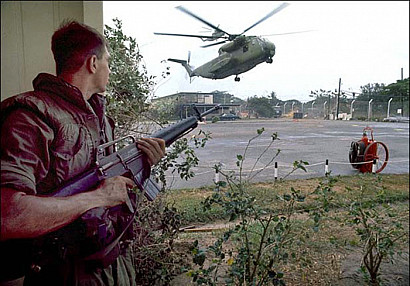"White Christmas" Signals American
Evacuation From Vietnam
Bing Crosby's "White Christmas" marks the end of the Vietnam War as the American Radio Service plays the tune during the Fall of Saigon - a signal for American personnel to evacuate. Many songs were written in reaction to the war, which ramped up in the late '60s. A few songs, notably "Still in Saigon" by The Charlie Daniels Band and "Born In The U.S.A." by Bruce Springsteen, explore the plight of veterans on their return home.
At the height of the Vietnam War in 1968, over 500,000 American troops were fighting it. Back home, battles raged between protesters - mostly young people who were morally opposed - and those who believed the war was necessary to stop the spread of communism. Most popular musicians were on the side of the protestors, and many expressed it in song: "Revolution" by The Beatles, "War" by Edwin Starr, "Ohio" by Crosby, Stills, Nash & Young (written by Neil Young in response to the Kent State shootings). As the war slogged on and American casualties mounted, President Richard Nixon faced increased pressure to end it. In 1973, he pulled American troops, leaving just a small support team to assist the South Vietnamese Army, who were left to fight the communist North Vietnamese on their own. Nixon told the South Vietnamese he would still support them, but when he was impeached in 1974, it became clear that America would never bring in more troops. With the American threat removed, the North Vietnamese launched an offensive in February 1975. On April 27, they surrounded Saigon, the capital of South Vietnam where the remaining Americans were based. The evacuation signal for Americans was an announcement by the American Radio Service stating the temperature in Saigon as "105 degrees and rising," followed by "White Christmas" by Bing Crosby - a song you would never hear in April. Around 11 a.m. local time on April 29, they made the broadcast, signalling American personnel to evacuation points in the city where helicopters airlifted them to safety. The last of the Americans, Ambassador Graham Martin, was evacuated at 4 a.m. on April 30. Americans who fought in the war, many wounded and suffering from PTSD, are left wondering what they were fighting for. The conflict is over, but their stuggles endure. Unlike the conquering heroes of World War II, they get no parades, no songs, little support. It's not until the '80s that popular songs start to emerge about these forgotten soldiers. The first to hit the charts is "Still In Saigon" in 1982, a song about a veteran who can still smell the jungle and hear the planes. Billy Joel releases "Goodnight Saigon" the following year, a rare political song in his catalog. Joel didn't fight in Vietnam, but he wanted to pay tribute to his friends that did. He based the lyric on conversations he had with veterans who explained what it was like to be sent to the other side of the world to fight a war that makes little sense. At some concerts, he brings local veterans on stage to sing it with him. Bruce Springsteen didn't fight in the war either, but was horrified at how its veterans were treated on the homefront. His song "Born In The U.S.A.," the title track to his 1984 album, tells the story of a soldier returning from Vietnam only to find he is spurned by the country he fought for. Most listeners miss the message though, because the rousing beat gives it an anthemic feel and the album art is draped in an American flag. To clarify the message, he begins playing it as a ballad and introducing it with stories about guys he knew that got sent to war, some of whom didn't return.

No comments:
Post a Comment